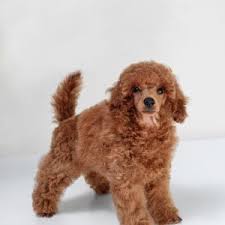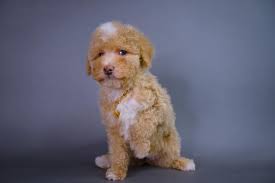Introduction
Merle Toy Poodle For Sale is a small but elegant breed. It is characterized by its intelligence, playful nature, and its hypoallergenic coat. Among the different color patterns that Toy Poodles can exhibit, there is the merle pattern, which has gained much interest due to its striking appearance. In this guide, we will delve into the specifics of merle Toy Poodles, looking into their characteristics, care requirements, and considerations when looking to purchase one. We will also consider frequently asked questions to allow a good understanding of this delightful breed.

Understanding the Merle Pattern
What is Merle?
Merle is a genetic pattern that produces a marbled or mottled look in a dog’s coat. It produces patches of color that are both lighter and darker, giving an interesting and beautiful appearance. Merle patterns can be very different between dogs, so no two merle Toy Poodles will resemble each other.
Genetic Basis of Merle
The merle pattern is due to a gene that influences pigment. This gene may “dilute” the distribution of coat color, creating an overlaying marbled effect. Breeding of dogs merle patterned, however, has to be taken with great precaution. Inbreeding dogs that are merle-patterned may lead to producing offspring with critical genetic health issues-in many cases deaf and blind-as the puppies would inherit two copies of the merle gene.
Breeding Considerations
Given the potential health risks associated with the merle gene, responsible breeding practices should be undertaken. A good breeder will usually breed a merle dog to a non-merle counterpart so as to minimize the possible health risks of the progeny.
Characteristics of Merle Toy Poodles
Appearance
The Merle Toy Poodles are small dogs that weigh from 4 to 6 pounds and are under 10 inches tall. It gives them a unique flair with the already charming look. A merle Toy Poodle sports a curly and dense coat, thus hypoallergenic, making it ideal for allergy sufferers. The base color of a merle Toy Poodle can be pretty varied, with shades including blue, gray, chocolate, and cream often with darker patches.
Temperament
Merle Toy Poodles share similar temperament characteristics that make all Poodles a great companion animal:
Intelligence: Toy Poodles rank among the brainiest breeds, being super trainable and obedient. They understand commands fast and enjoy intellect stimulation.
Affectionate Nature: These dogs are loyal and tend to be very attached to their family. They live on interaction with people and tend to be affectionate companions.
- Playfulness: Merle Toy Poodles are happy, playful dogs that really love games and activities with owners. They often have a great zest for life, which brings much joy to their households.
- Alertness: Although small in size, a Toy Poodle is alert and has the alerting sound for its owner about what may be going around the household.

Health Issues
In spite of this, there are health risks associated with the merle gene that potential owners should be aware of.
1. Progressive Retinal Atrophy (PRA)
PRA is a genetic disease that causes degeneration in the retina and may result in vision loss. This disease can be detected with early and frequent veterinary eye exams.
2. **Congenital Deafness
If the merle gene occurs, it can increase the risk of congenital deafness. In addition, this condition may affect one or both ears so that testing puppies for hearing impairment is essential.
3. Skin Allergies
Like other poodles, merle Toy Poodles tend to have skin allergies. As such, regular grooming and appropriate skincare are able to help these problems to some extent.
4. **Dental Problems
Toy Poodles are prone to dental problems because of the small size. Also, there’s the need for regular brushing and professional cleanings to keep the mouth healthy.
5. Hip Dysplasia
Hip dysplasia is less likely in Toy Poodles, but it occurs; this means that implementing responsible breeding practices and screening helps reduce its prevalence.
Merle Toy Poodles Grooming and Care
Proper care of a merle Toy Poodle includes frequent grooming and finding attention to their specific needs.
Coat Care
- Brushing: Toy Poodles have to be brushed up at least 3 to 4 times a week to avoid matting and to keep their coats in its healthiest shape. A slicker brush and metal comb will also work wonderfully.
- Bathing: Bathe your merle Toy Poodle every 4 to 6 weeks using a gentle dog shampoo. Bathing excessively may strip the coat of its oil, so it is essential to find a balance.
- Trimming: Trips to the groomer are recommended every 6 to 8 weeks so that the coat stays in form and won’t develop tanglements.
Ear and Dental Care
- Ear Cleaning: Because of their floppy ears, Toy Poodles are susceptible to ear infections. Cleaning their ears with a veterinarian-recommended solution often is essential for maintaining healthy ears.
Dental Hygiene : Brush a Poodle’s teeth several times a week and give dental chews to decrease the amount of plaque.
Exercise and Mental Stimulation
Merle Toy Poodles need daily exercise for them to be generally healthy and happy. This can range from at least 30 minutes of physical activity every day through walks, plays, and training sessions. Mental stimulation is just as important; the best way to stimulate your Poodle’s mind is with puzzle toys, obedience training, or agility courses.
How to Find Merle Toy Poodles for Sale
If you’re interested in acquiring a merle Toy Poodle, it’s crucial to find a reputable breeder. Here are some tips for locating the right breeder:
1. Research Reputable Breeders
Look for breeders who specialize in Toy Poodles and have a solid reputation in the community. Check online reviews, ask for references, and seek recommendations from other dog owners.
2. Health Testing
A responsible breeder will health test their breeding dogs for hereditary diseases. Ask to see all the health clearances of the puppy’s parents to ensure they are free from hereditary issues.
3. Visit the Facility of the Breeder
If possible, visit the facility of the breeder to see where the puppies live and where their parents live. A clean, safe, and nurturing environment is important to raise healthy puppies.
4. **Ask Questions
Don’t hesitate to ask the breeder about their breeding practices, health testing, socialization efforts, and any concerns you might have with the merle gene. A reputable breeder will be open and willing to share information with you.
5. Adopt
In addition to purchasing from a breeder, consider adopting a merle Toy Poodle from a rescue organization. Many dogs in need of homes can still make wonderful companions, and adoption can be a rewarding experience.
Frequently Asked Questions (FAQs)
1. What is a merle Toy Poodle?
A merle Toy Poodle is a Toy Poodle that exhibits the merle color pattern, characterized by a mottled or marbled appearance in their coat.
- Does the AKC recognize merle Toy Poodles?
No, The AKC does not officially recognize the merle color pattern for Toy Poodles. Thus, merle Toy Poodles are usually categorized as designer or hybrid dogs. - What are the acceptable colors of merle Toy Poodles?
Merle Toy Poodles come in various base colors such as blue, grey, chocolate, and cream, mixed with darker patches that create this marbled effect.
4. How much does a merle Toy Poodle cost?
The price of a merle Toy Poodle varies greatly based on breeder reputation, location, and lineage of your puppy. Prices are usually around $1,500-$4,000 or more.
5. Are merle Toy Poodles hypoallergenic?
Yes, Toy Poodles, even merle ones, are considered hypoallergenic because they have curly coats and less dander than other breeds.
6. How long do merle Toy Poodles live?
On average, merle Toy Poodles live for 12 to 15 years. This depends on genetics, health, and care.
7. Do merle Toy Poodles shed?
Poodles of all colors are low-shedding breeds. Nonetheless, regular grooming is essential to maintain their coats and prevent matting.
8. **Are merle Toy Poodles easy to train?
This means that merle Toy Poodles are highly intelligent and eager to please. Thus, training is quite possible with them. Positive reinforcements should be used when handling the breed.
9. What do I feed my merle Toy Poodle?
A merle Toy Poodle will thrive on a high-quality, well-balanced diet related to the Poodle’s age, size, and activity level. Discuss specific dietary needs with your veterinarian.
10. What sort of health issues can I expect with my merle Toy Poodle?
Yes, merle Toy Poodles seem to be prone to specific health problems such as progressive retinal atrophy (PRA) and congenital deafness. Responsible breeding can help minimize these risks, however.
Conclusion
Merle Toy Poodles are an attractive variation of the Toy Poodle breed, and it is known for their unique coat patterns as well as charming personalities. Although they are likely to inherit the cognition, playful temperament, and low-shedding needs of all Toy Poodles, there are genetic issues and health hazards that the specific merle pattern confers on these dogs that buyers will need to consider. The merle Toy Poodle is sure to add charm to your family if you research properly, choose a responsible breeder, and prepare for the joy and companionship that this wonderful breed can bring into your life.

